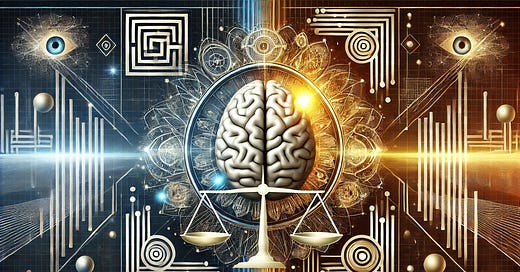Decoding the Mind’s Shortcuts: Understanding Biases, Heuristics, and Fallacies
What are the differences and how they might affect you.
Sometimes, we use the terms cognitive biases, heuristics, and logical fallacies interchangeably, particularly in discussions on this Substack. To provide clarity and encourage accurate use, let’s take a closer look at what sets them apart.
Let me know in the comments which of these you have noticed yourself or others using.
Cognitive Biases: How Our Minds Take Shortcuts
Cognitive biases are systematic patterns of deviation from rationality in judgment and decision-making. They occur because the brain relies on mental shortcuts (heuristics) to simplify complex information. While these shortcuts often help, they can lead to distorted perceptions or flawed conclusions.
Common Characteristics:
• Automatic Processing: Biases occur unconsciously, without deliberate thought.
• Predictable Patterns: They tend to manifest consistently across individuals.
• Distorted Perception: Biases alter how we perceive reality or evaluate information.
Examples:
• Confirmation Bias: Seeking information that supports existing beliefs while ignoring contradicting evidence.
• Anchoring Bias: Over-relying on the first piece of information when making decisions.
• Sunk Cost Fallacy: Continuing an endeavor because of past investments, even when it’s irrational.
• Dunning-Kruger Effect: Overestimating one’s abilities in areas where they lack expertise.
Why They Matter:
Cognitive biases affect decision-making, relationships, and problem-solving. Recognizing these biases can lead to more balanced and informed choices, improved interpersonal understanding, and better problem-solving outcomes.
Heuristics: Quick Solutions, Not Always Right
Heuristics are mental shortcuts or rules of thumb that simplify decision-making and problem-solving. They enable quick judgments, especially in familiar situations, but can sometimes lead to errors or cognitive biases.
Common Characteristics:
• Speed and Simplicity: Prioritize efficiency over accuracy.
• Automaticity: Often operate unconsciously.
• Adaptability: Work well in routine or low-stakes scenarios.
Examples:
• Availability Heuristic: Judging likelihood based on how easily examples come to mind (e.g., fearing plane crashes after seeing them in the news).
• Representativeness Heuristic: Categorizing based on stereotypes rather than probabilities.
• Anchoring Heuristic: Being overly influenced by initial information when making decisions.
• Recognition Heuristic: Favoring options that are familiar or recognizable.
Why They Matter:
Heuristics save time and cognitive effort, especially when complete information isn’t available. However, they can lead to oversimplification, overgeneralization, or systematic errors. Combining heuristics with critical thinking can mitigate these drawbacks and improve decision-making in complex scenarios.
Logical Fallacies: Flaws in Reasoning
Logical fallacies are errors in reasoning that undermine the validity of an argument. They may arise from poor logic, intentional manipulation, or misunderstandings. While they can seem persuasive, they fail under closer scrutiny.
Common Characteristics:
• Flawed Reasoning: Depend on invalid or unsound logic.
• Persuasive Appeal: Can appear convincing despite their flaws.
• Disruption of Debate: Shift focus away from genuine reasoning or evidence.
Examples:
• Ad Hominem: Attacking the person rather than their argument.
• Strawman: Misrepresenting an argument to make it easier to refute.
• Appeal to Authority: Assuming something is true because an authority figure says so.
• False Dichotomy: Presenting two options as the only possibilities when more exist.
Why They Matter:
Understanding logical fallacies enhances critical thinking, strengthens arguments, and fosters better communication. Identifying and avoiding fallacies keeps debates productive and builds trust in reasoning. However, unchecked fallacies can mislead audiences, erode trust, and impede progress.
Summary: Different Tools, Different Pitfalls
Cognitive biases, heuristics, and logical fallacies all involve deviations from optimal reasoning but differ in nature and application:
• Cognitive biases are systematic judgment errors caused by mental shortcuts.
• Heuristics are those shortcuts themselves, simplifying decision-making but occasionally leading to errors.
• Logical fallacies are flawed reasoning patterns that undermine the validity of arguments, often used deliberately in rhetoric.
While biases and heuristics are largely unconscious and arise from how our minds process information, logical fallacies are more deliberate, reflecting faulty reasoning or argumentation.
These mental shortcuts and reasoning errors may not seem relevant to you—but consider that this, too, could be just another story you tell yourself.




